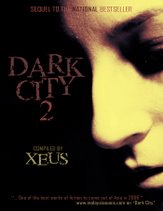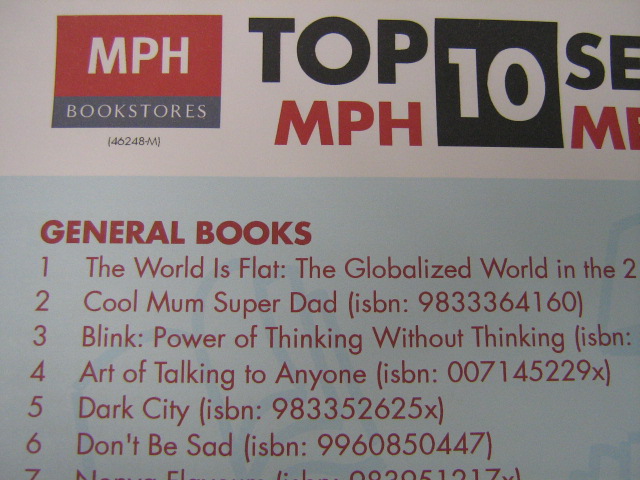Being Edited
I'm buoyed by Eric's recent posts about Editing and how editors feel about receiving a good and bad manuscript.
Let's come from another persective: The writer's. How do YOU feel about being edited?
For me, being edited is a humbling experience, whether it's done by a conceptual editor or a grammar editor.
1. We realise our grammar, hyphenation, punctuation etc is not that great after all. Most of us tend to dispense with hyphenation, punctuation etc, thinking it has nothing to do with writing and that it's an editor's job. But in countries like the UK, they can just throw the manuscript out if we don't think of all the niceties.
2. We realise that our plot, or certain aspects of the plot, or character, is not as exciting as we think it is. Or that it doesn't make sense.
3. We realise we put in more words that we intended.
Several fanous editor and writer friends were very kind to edit the first 3 chapters of Billy Lang for me so that the manuscript is as perfect as it can be before I send it off. And even though I've rewritten them many times, it still is a humbling experience to be edited, and I'm very grateful for all of them who are looking out for me. As we writers/editors should be doing for each other to make our manuscripts as perfect as possible before we send it out to the foreign lit agencies.
As for Dark City 2, some of you were asking me, fear not! It's definitely on its way (July). It needs to be edited thoroughly (in the same vein again) before publication, and when the grammar editor and I are not happy about something, we go back to the author. A local book deserves the same editing and vetting scrutiny as a foreign book and we will not compromise on quality.
So how do you feel when you get edited?



24 comments:
Hello Lynette - For publishing houses, the normal procedure is to reject a manuscript outright if the author does not allow us to edit their work. It is difficult to edit if we have to engage in constant negotiation and bargaining with authors just to correct their sentences. The publishing house cannot lose control over the editing process. Period. And if the manuscript is not of the quality we are looking for, we stop working on it and find a way to change that. The editor-author relationship is long term and we cannot afford to start on a wrong footing.
Some writers seem more interested in having a printer print their book as it is - without it being edited at all. They don't need a publishing house for that. If this is the case, then they should self publish their work by paying a typesetter to set it and a printer to print it. Only then can they retain the essence and purity of their writing!
We do take on imperfect books if we think they have latent potential only if the writers are willing to work hard on improving them. Most of them are not willing to do that.
Very revealing post, Eric. I don't understand why some writers do not allow their work to be edited anyway. No matter how good they are, there's always some mistake or other, and it's always good to have another perspective on plot and characterisation.
Just the other day, my uncle was complaining about an article he wrote that I managed to get Star to publish for him. He complained that they edited him. I said, "Well, your article was too long in the first place. Of course they have to edit you!" My uncle of course considers himself extremely well-read and literary and thinks newspaper editors 'don't get him'.
I think that's why some writers refuse to allow their work to be edited. They think they are far superior to everyone else and other people are 'too dumb or not good enough' to 'get them.'
I agree. While we writers may dispute editorial decisions, it's important to remember that the editor is the gatekeeper and has the final say.
An established author once told me that being published is not about writing for yourself, or even for an audience. It's about writing for your editor.
There's a nugget of truth in that.
Yes, no matter how good the writer is, there are always stuff to be edited. It is a joy to edit some excellent writers. Because you don't need to edit much.
For newspaper or magazine articles, if we do not wish to be edited much, we must adhere to the word count as required by the paper. And to do that we must do lots of self-editing before we submit the article to the paper. Then it will be slightly edited or printed as it is.
For books - most Malaysian writers underwrite. They do not have enough material for a book.
All too often, we come across folks who go: "Our government has no accountability!" But these same people seem to shirk editorial accountability when they write. Interesting.
I like to be edited. It helps improve the work. If I don't agree with the editing, I can always put forth my point to the editor. Right, Xeus?
Well said, John. One editor's meat is another editor's poison :)
Eric, it is true that for newspapers, it is all about space. A Picture must be put in, as well as the advert. An article shouldn't stretch for too long because it'll be boring to read. It's the same for magazines.
I believe that a lot of Malaysian writers tend to tell the plot as it is. They don't have much to describe and embellish along the way. The description and the embellishments of the sentences are what give the book its thickness and depth, in more ways than one.
Yes, Lydia. It is true. Then one can discuss with one's editor how best to put it across. I guess also it's how one puts the point across. A writer must do so politely and in an encouraging manner. It is writers who are brusque and difficult that editors find it difficult to deal with.
Yes, Lydia. It is true. Then one can discuss with one's editor how best to put it across. I guess also it's how one puts the point across. A writer must do so politely and in an encouraging manner. It is writers who are brusque and difficult that editors find it difficult to deal with.
Strange as it may seem, the good writers are not the ones I have problems editing. Why is it always the bad writers who give me a headache: they are usually arrogant and stubborn.
And that's what separates the good and the bad.
We must be humble always. And remember that editors are always patient when they're explaining something to us. Just as we must be patient as well in accepting someone else's viewpoint.
How true. We all need to be reminded from time to time.
Tash Aw is a real humble author: "I felt that telling people 'I am a writer' sounded ridiculous. Even now, when people ask me what I do for a living, I tell them 'I write books' because telling them 'I am a writer' sounds so grand." If only more Malaysian writers emulate Tash!
Ironically, it's the media coverage of Tash and his monetary success that has inflated the egos of so many writers.
Now, more than ever, you meet folks who go: "I'm going to be the next Tash Aw. I don't need to be edited. Trust me."
Yeah. Right.
The editor is usually right. Sometimes though I may not agree with the changes. But often these changes are insubstantial, minor even. It doesn't affect the story, the texture of the piece. So no problem.
At times, the changes affect content. For example, deleting a sentence or two. If I consider the content important to the story, the subtle message even, then I'll negotiate.
I'm lucky, as my editor is most understanding and flexible. For any writer, this is one relationship that's vitally important.
That's right.
Most times, there's plenty of room for negotiation. Editors are not malevolent dictators.
If you are a writer, it's in your best interest to cooperate with your editor. If you are unreasonable and difficult, that will be a stain on your reputation. The publishing fraternity is a small one. Word spreads quickly.
Kak Teh said...
xeus, you know my feelings about this. and over the last few weeks, thanks to you I had seen, what I had not seen before- seen through another pair of eyes.
I did a book here in London with another writer - and I said - we need someone to edit - and he said - there's no need, we can edit ourselves. I was shocked and horrified! I believe that everyone needs an editor if not two.
John and TH, most true. We have to have a good relationship with our editors, and to listen, not for the sake of listening, but really learning what we cannot see for ourselves.
Kak Teh, glad to be of help!
Xeus,
It can all be in a state of flux. Editor can be writer and writer can be editor. What's important is to be open, in heart and mind.
Kak Teh, can imagine how shocked you were.
"He who thinks he does not need editing needs more editing than he thinks."
I've seen the raw copy of a few excellent feature writers and even they sometimes miss out this and that, and they know that is all too possible.
Post a Comment